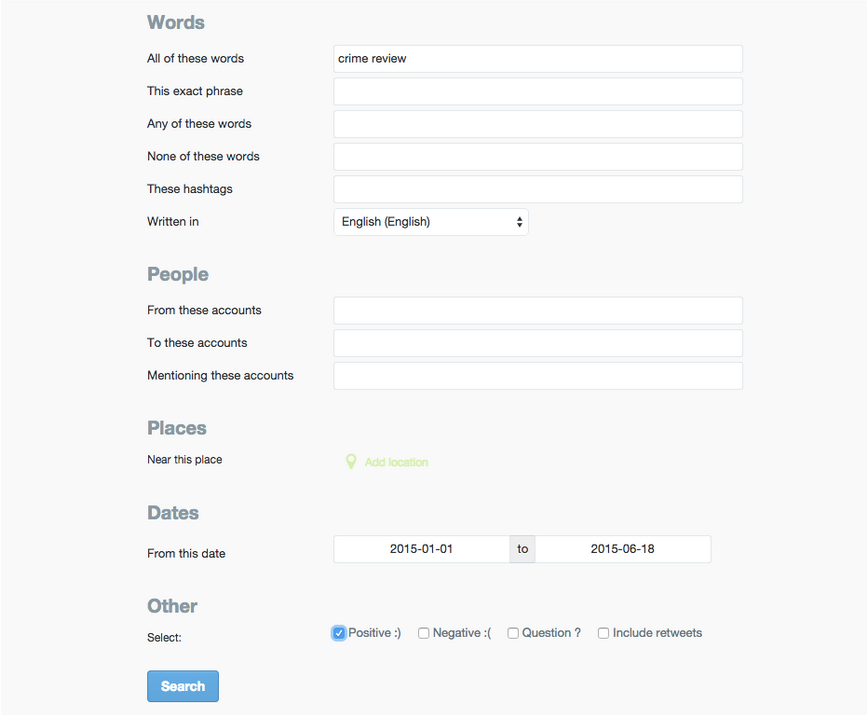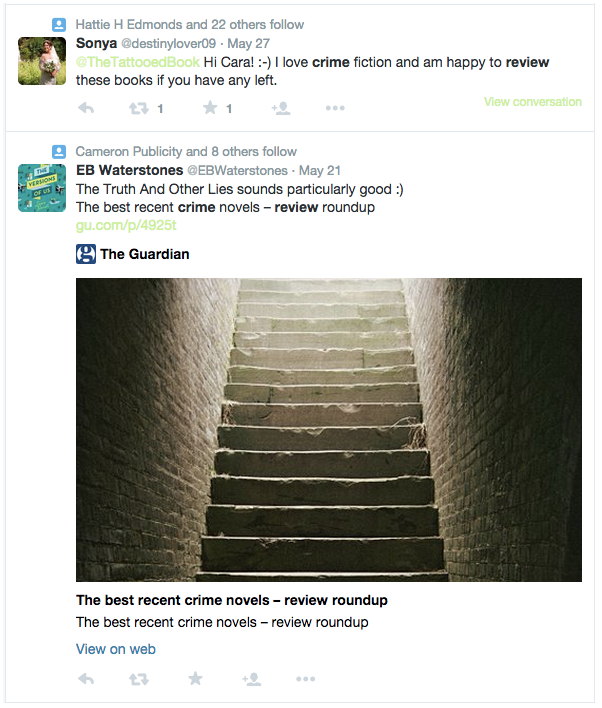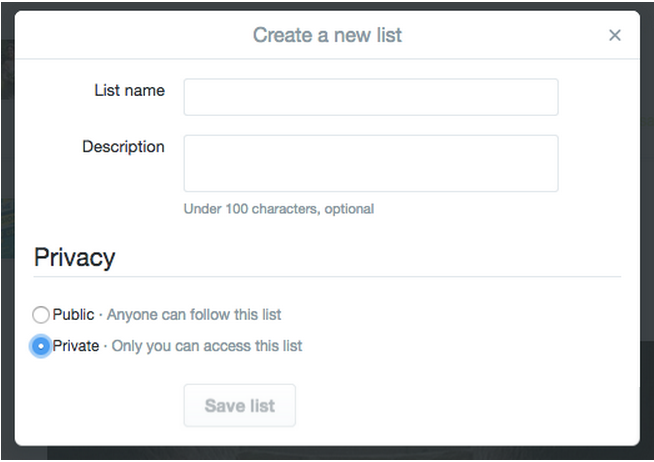How to Use Twitter to Find and Engage Book Reviewers
Today’s guest post is by Ricardo Fayet, one of the founders of Reedsy:
“You need to be on Twitter.” That might be one of the most common phrases I’ve heard at social media workshops and conferences for authors. Why? “Because everyone is on Twitter!”
But what is it that you can do effectively on this massive social network? Tweeting about your book or promoting your latest blog post doesn’t work anymore. The growth of Twitter has led to a significant reduction in click-through rates and made tweets far less effective. You are going to get more visits to your author website if 100 people see it on their Facebook feed than if 1,000 people see it on Twitter.
Another problem is that so many authors can be stumped when thinking of new ways to use social networks like Twitter. Often when they try it out and see how little engagement there is from their audience, many authors despair. But fear not! Twitter can still be extremely useful in building relationships with influencers and reviewers.
Don’t know where to start? Well, here is a quick step-by-step guide on how you can use Twitter to find book reviewers, engage them, and ultimately get them to read your work. This can be extremely powerful for authors and is well worth a try.
1. Use Twitter Advanced Search to find tweets, hashtags, and people
This is a pretty powerful tool that enables you to search the whole Twitter database for tweets, hashtags, and people who match certain keywords or locations. Let’s say you are a crime/thriller author. Just put in “crime” and “review” in the “all these words” category, select English as language, and then set a time frame for the search. I’d also recommend checking the “positive feedback” box (you don’t want to find “negative” reviewers, do you?)
2. Follow the reviewers you like
When looking through the search results, you will mainly find tweets from book reviewers, but you are also going to get a lot of tweets from authors looking for reviewers. Go through all the reviewers that come up and check them out exhaustively (especially the “review policies” on their websites). Then “follow” the ones you like and that you think would be right for your book.
3. Create a Twitter private list
This is going to be your way to “isolate” those reviewers from your main Twitter feed so that they don’t get drowned in “Twitter noise.” Make sure you create a “private” list, and not a public one—otherwise they’ll all be notified that you just added them to your “crime book reviewers” list!
4. Build a relationship
This is the real secret. Check your private list feed at least once a day and interact with some tweets/people. It will take some time and a little effort to build these relationships. Don’t forget, however, that these people are all readers of your genre, so it shouldn’t be hard to find common things to talk about!
5. Don’t go for the hard sell
Exchanging a few tweets with reviewers is exciting, but hold your excitement! You may be dying to let them know “by the way, I’m a crime author myself,” but resist the temptation. Exchanging genuine conversation about your love of crime fiction and the work of the reviewer is a far better idea in the long run. You can make a relationship go sour very easily by pushing the hard sell. If you engage genuinely and honestly, before long they will check out your profile and see that you are a crime author. The chances are, at some point, they will ask you. Then you’ve done it!
Of course, there are plenty of other ways to find book reviewers in your genre, but Twitter presents several advantages:
- All book reviewers are on Twitter.
- Interacting with a “stranger” on Twitter is not a “weird” thing to do. It’s what makes Twitter so brilliant.
- Reviewers are flooded with e-mails and “read my book” tweets. If you go in with a genuine comment on one of their tweets, the chances are you will get noticed and stand out.
So don’t quit on Twitter just yet! It might not drive your book sales, but it has a lot of other uses. I’d love to hear about how you use it yourself!
 Ricardo Fayet is a cofounder of Reedsy, an online marketplace that enables authors to directly access the wealth of editing and design talent that has started leaving major publishers over the past few years. A technology and startup enthusiast, he likes to imagine how small players will build the future of publishing. He also blogs about book marketing and conducts weekly author interviews on the Reedsy blog.
Ricardo Fayet is a cofounder of Reedsy, an online marketplace that enables authors to directly access the wealth of editing and design talent that has started leaving major publishers over the past few years. A technology and startup enthusiast, he likes to imagine how small players will build the future of publishing. He also blogs about book marketing and conducts weekly author interviews on the Reedsy blog.
Sign up to Reedsy via this link before end of September to get a $50 discount on any collaboration with one of our professionals!
Feature Photo Credit: encaputxat2 via Compfight cc















I think the main thing with Twitter is just to be genuine. Follow people whose content you genuinely enjoy, talk to them about your mutual interests, do this for A LONG TIME and then, when appropriate, approach them about how you can make your relationship mutually beneficial (i.e. a reviewer, a beta reader, a critique partner, a blogger, etc.)
I totally agree, Mary. Twitter is a social network where you have to be as patient and genuine as possible. The problem with Twitter is that anyone can message anyone, so people are immediately going to be suspicious if they don’t know you and you approach them in a non-genuine way.
It’s better to let people check your profile out rather than pointing them to your books or website. If I have a chat on Twitter with someone I don’t know you can be sure I’ll check out their profile and possibly website!
Thank you, Ricardo, for the insights. I must admit, I have never been on Twitter, or Facebook. Long story, but much of it has to do with family security issues. I do, blog, though, am a freelance copywriter and editor, and write short inspirational, creative non-fiction. (I am also outlining a fictional YA novel.) However, my husband and I are launching a tech business and will have our first technical (instructional) manual ready to go by December. I know we’ll have to work our way into these areas, and I appreciate the direction you lay out. And I agree, it has so much to do with building relationships! My husband gets so irritated reading short, nothing-but-hard-sell snippets people write on blogs and other social sites. He equates it to writing on the bathroom wall! Your advice gives me a great template to use to start all of this right, and market smart. Thank you!
Glad you found it useful, Andrea! If you already blog and keep putting good content on a regular basis out there, it’s much more powerful than social media! Plus it gives you something to share on social media.
In any case, if you’re launching a tech business, it’s pretty much like launching a book: there are so many new tech businesses out there every day that no one will pay attention to yours if you advertise it too directly and blatantly. All the best with it!
Thanks for these great tips!
I learned a lot from this article. Thank you! I’ve already got almost 2,000 followers, but had no idea you could “advance search” for reviewers. Good stuff.
Thanks Kristi, glad I could help! You can use Twitter’s advance search for pretty much anything. Also, keep an eye on an upcoming startup called “Find my Audience”: they apply a similar concept across all social media to find people who’d be interested in your book.
Genuine interaction. These two words combined are powerful. Thanks for making us aware or reminding us of Twitter’s advance search. Posting in your face links “Buy my book, Read my book, Review my book” brings animosity at best. Great post!
Thanks Paul, glad you liked it! I think many authors don’t really get Twitter — why this social network exists, what it’s all about, what active Twitter users like to see, etc. But because there’s this concept that “you have to be on Twitter” if you’re an author, they create an account, follow massively, and post only about their book, because they don’t know what else to do.
Generally my advice to authors is to only be active on the social media platforms they genuinely enjoy. You should try all out, to give it a go and see if it reflects your personality, but not stay on it if you’re uncomfortable.
Thanks so much for this advice. The search parameters are going to be particularly useful!